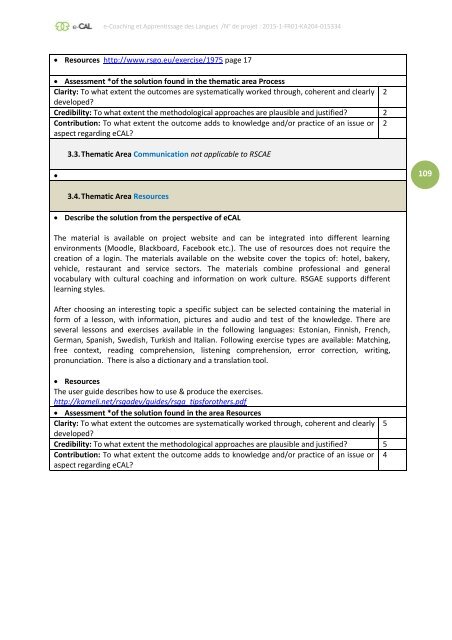e-CAL - e-Coaching et Apprentissage des Langues
The ERASMUS+ project e-CAL presents the result of an analysis of support methods in the case of language learning using web-based Open Educational Resources (OER).
The ERASMUS+ project e-CAL presents the result of an analysis of support methods in the case of language learning using web-based Open Educational Resources (OER).
Create successful ePaper yourself
Turn your PDF publications into a flip-book with our unique Google optimized e-Paper software.
e-<strong>Coaching</strong> <strong>et</strong> <strong>Apprentissage</strong> <strong>des</strong> <strong>Langues</strong> /N° de proj<strong>et</strong> : 2015-1-FR01-KA204-015334<br />
Resources http://www.rsgo.eu/exercise/1975 page 17<br />
Assessment *of the solution found in the thematic area Process<br />
Clarity: To what extent the outcomes are systematically worked through, coherent and clearly 2<br />
developed?<br />
Credibility: To what extent the m<strong>et</strong>hodological approaches are plausible and justified? 2<br />
Contribution: To what extent the outcome adds to knowledge and/or practice of an issue or 2<br />
aspect regarding e<strong>CAL</strong>?<br />
3.3. Thematic Area Communication not applicable to RSCAE<br />
<br />
109<br />
3.4. Thematic Area Resources<br />
Describe the solution from the perspective of e<strong>CAL</strong><br />
The material is available on project website and can be integrated into different learning<br />
environments (Moodle, Blackboard, Facebook <strong>et</strong>c.). The use of resources does not require the<br />
creation of a login. The materials available on the website cover the topics of: hotel, bakery,<br />
vehicle, restaurant and service sectors. The materials combine professional and general<br />
vocabulary with cultural coaching and information on work culture. RSGAE supports different<br />
learning styles.<br />
After choosing an interesting topic a specific subject can be selected containing the material in<br />
form of a lesson, with information, pictures and audio and test of the knowledge. There are<br />
several lessons and exercises available in the following languages: Estonian, Finnish, French,<br />
German, Spanish, Swedish, Turkish and Italian. Following exercise types are available: Matching,<br />
free context, reading comprehension, listening comprehension, error correction, writing,<br />
pronunciation. There is also a dictionary and a translation tool.<br />
Resources<br />
The user guide <strong>des</strong>cribes how to use & produce the exercises.<br />
http://kameli.n<strong>et</strong>/rsgadev/gui<strong>des</strong>/rsga_tipsforothers.pdf<br />
Assessment *of the solution found in the area Resources<br />
Clarity: To what extent the outcomes are systematically worked through, coherent and clearly 5<br />
developed?<br />
Credibility: To what extent the m<strong>et</strong>hodological approaches are plausible and justified? 5<br />
Contribution: To what extent the outcome adds to knowledge and/or practice of an issue or 4<br />
aspect regarding e<strong>CAL</strong>?


